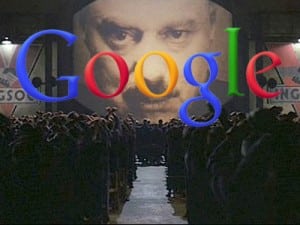Seth Godin’s recent post “Is Google jumping the shark?” got me thinking. A lot.
In his post (and I liberally paraphrase), Godin cites Google’s betrayal of its signature “don’t be evil” policy with a couple of its more recent, notable offenses. Specifically, he points to its being found to have circumvented privacy settings to hack into and steal user data, and to its recent announcement that it intends to sell the names and faces of Google+, YouTube and other Google service users (that endorse or +1 companies and their products/services) to advertisers – and as originally drafted, without those users’ knowledge, much less their consent.
My immediate thought was yes, Google has most definitely jumped the shark here. As an online publisher and SEO copywriter, its complete eclipse of organic search data to all but its advertisers is one thing. But as a user? Well, that’s just not right. Anyone up for Yelp and Duck Duck Go?
The larger point Godin makes is the conundrum inherent to profit-seeking public companies: staying true to their original, customer-serving and branding mission versus literally selling out to advertisers for immediate financial wins to appease their stockholders.
So has Google gone to the dark side? Or is it simply behaving as any other (wicked) smart public company? Or, as Godin suggests, are we perhaps watching (and involuntarily dealing with) an internal company schism playing out?
Let’s weigh the evidence…
Paying to Play on Google: Dark Search goes Black
It seems Google has ballooned into a search and social cyber-bully that has the online industry saying “Thank you, Sir, may I have another?”
Okay, maybe a stretch, but as the largest search engine on the planet, Google has had its way in favoring advertisers over publishers, marketers and arguably, users.
Referring to Google’s recent muscle flex with its ‘Not Provided’ search data blackout to all but its advertisers, Danny Sullivan wrote in “Google’s Plan To Withhold Search Data & Create New Advertisers”:
How do you convince a bunch of publishers to buy ads on your service? If you’re Google, how about withholding data from those publishers about how people are finding their sites, as a way to drive them into your ad system?
In the interest of weighing the evidence, there are other voices in the industry (such as Thom Craver) that advise search and SEO pros to stop whining and do their job.
And Sullivan does mention a work-around for search and SEO pros that only requires signing up for an AdWords account and creating an empty campaign. (That, or deal with Google’s Python script).
Sullivan also alludes to the point that Godin made about the inevitable internal power struggle between branding and advertising sales departments, saying while he didn’t think Google has deliberately withheld search terms to publishers to push AdWords, “…the search team couldn’t veto that department’s decision.”
Then again, Sullivan notes that Google’s defense against accusations that its actions are in the interest of increasing ad revenues are weak, at best. At worst, Google “…is forcing publishers into its ad interface to get information about their ‘non-paid’ listings…” and “…suggests an attempt to upsell people on the idea of buying AdWords…”
Taking a Page from Facebook: The G+ “Shared Endorsements” Angle
Remember the kicking and screaming that went on when Google+ was forced down the industry’s collective throat? Eventually it subsided, as even the most reluctant of online publishers and marketers were forced to either embrace Google+ or effectively disappear from Google search.
And of course, there are definitely upsides to using Google+, such as Authorship, its live “Hangouts” feature and G+ communities. But for many, it felt like a coercive “join or face search oblivion” strong-arm move on Google’s part.
For advertisers, Google will soon offer a golden opportunity to take advantage of “shared endorsements” whereby Google+ (and other Google services, such as YouTube) users’ names, faces, comments and endorsements (plus 1’s) can be purchased from Google for use in online ads.
According to a report in The New York Times:
When the new ad policy goes live on Nov. 11, Google will be able to show what the company calls shared endorsements on Google sites and across the Web, on the more than two million sites in Google’s display advertising network, which are viewed by an estimated one billion people. If a user follows a bakery on Google Plus or gives an album four stars on the Google Play music service, for instance, that person’s name, photo and endorsement could show up in ads for that bakery or album.
As Greg Sterling writes in “Google Launching ‘Sponsored Endorsements’ – User Ratings, Comments, Likes Integrated Into Ads”, Google has learned from Facebook’s “Sponsored Stories” ads lawsuit and updated its terms and conditions to allow Google+ users to opt out of being included in online ads (but not in other places such as Google Play).
Sterling goes on to observe: “Google must have determined that the potential lift that these ads would deliver (based on Facebook’s performance data) justifies the potential controversy they’ll generate. It also must have determined that it can avoid Facebook’s mistakes.”
And now that Google has amended, er, updated its “Sponsored – er, Shared – Endorsements” terms to allow users to opt-out before the fact – like any credit card company or bank does in that fine print privacy clause before it goes ahead and sells your name and contact information to their “partners” – it isn’t all that creepy, is it?
One could argue that Google is just behaving like any other savvy big corporation, knowing it harbors a gold mine in user social endorsements just dying to be converted into a revenue stream.
The User Privacy Defense Angle: Riddled with Holes
Now, this “Shared Endorsements” user data sell-off does seem to fly in the face of Google’s user privacy defense in encrypting all of its search query data – again, except for those with AdWords accounts.
As Danny Sullivan states in “The Questions Google Refuses To Answer About Search Privacy”:
Do a search on Google, click on an ad, and what you searched for is transmitted to the advertiser, along with your IP address, leaving you open to being targeted for ads based on that term in the future. This has been a loophole since Google’s first ramp-up of Google Secure Search in 2011. It never offers a decent explanation for why it does this.
So how does selling off users’ identities for ad integration square with protecting their privacy? Google recently made opting-out a clear and real option on its home page, carefully explaining how its sponsored stories work and how to opt out. Apparently its legal department has been busy.
But what of it being found to have worked around privacy settings to hack into and steal user data?
Even if we are indeed just witnessing an internal battle between Google’s own advertising and branding/consumer advocacy departments, it seems to me that the evidence does point to Google coming precipitously close to going over to the dark side – beyond its dark search, and beyond just being wicked smart.
What are your thoughts?



































12 Responses
One thing I don’t get is why there is so little talk about other services that offer stats. I’ve still got Awstats running on two sites for which I don’t need deep analysis. I also still have Xiti running on another, and it’s pretty good. Why blank out the competition?
Something tells me that in the future there will be 2 search engines. One will be incredibly smart and efficient and will require payment. The other will be a mess and it will be free.
Sebastian, thanks for your thoughts on this! That is one Huxley-like vision you have, and that may indeed to be the case. With the increasing commercialization and laissez-faire economics of the internet, though, I doubt a free “mess” of a search engine would survive. Paying advertisers foot the bill, both online and off. That is the reality. But it seems to me that there does come a turning point in any publishing, social or search company where it either serves its original mission or sells out to their advertisers. It’s a rare animal that can survive the tug-and-pull of doing both well.
Interesting post. But i am still a fan of Google 🙂 keep up the good work.
Hi Ravi. I too appreciate Google for what it has done for search and how it seems to be striving to make search a better user experience. But I do not appreciate Google for its apparent hypocrisy and slippery work-arounds re: user privacy. Thanks for your comment!
They’ve always seemed a little evil but business is business… It’s rarely personal.
Yeah, it only gets personal when your face and user data get shared all over the web as an endorser of a business and their products/services. Thanks, Matt.
@Adam so if you endorsed a product say 1 1/2 yrs. ago and that product goes sour … you don’t care that you would now be seen touting a shitty product….. it’s just whoring shares and likes and testimonials… sorry I don’t like pimps!
Well in my opinion, why would anyone afraid if his/her name and picture is used by all Google’s platforms (Google +, Youtube etc.), I mean we all determine what we will share or not, like we don’t need to use our real picture or name either 🙂
And I agree with you it’s becoming evil in many parts, did you noticed if you open other browsers then Chrome and go to the Google Home page in the corner there is always notification to install and use Chrome, describing it’s the fastest browser etc. Google forcing people to use it’s features wherever we go, I mean I don’t have anything against their products, they’re all good, but it’s really persistent creature 😀
Thanks for this article and wish you a great day,
Adam
Thanks for your comment, Adam. Yes, I have noticed Google’s rather aggressive marketing 🙂 As for being included in ads, I think that is a matter of principle and privacy. Sharing your “endorsements” in whatever form with a circle of friends and/or colleagues is one thing. Having your identity show up on an online ad broadcast all over the web is quite another – especially it being an uncompensated endorsement 😀 And I would imagine that it would open a person up to all kinds of spam from other related industry advertisers via targeted email blasts, etc. Personally, I’d rather not. To each his/her own! At least Google got smart and made opting out a real option. Like I said, it has Facebook’s lawsuit to learn from, and a busy legal team.
As I am, Emory! Thanks for your vote 🙂
I’m rooting for the branding dept!